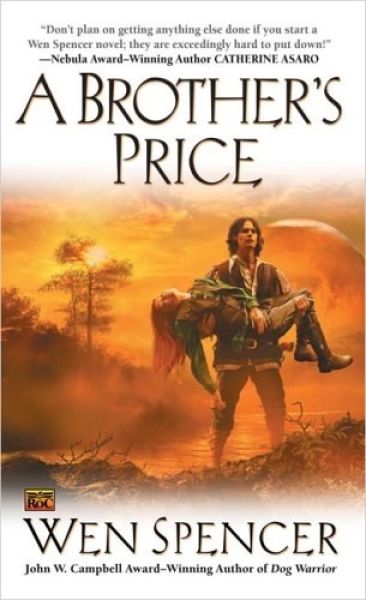It’s a ma’am’s world
A Brother’s Price
By Wen Spencer

5 Jul, 2016
0 comments
In the world of Wen Spencer’s 2006 A Brother’s Price, a world where male babies rarely survive to term, young men of breeding age are a valuable commodity. Jerin Whistler is more valuable than most; he comes from gentry and is good-looking as well. That’s lucky for his sisters, who can trade him off to buy a husband of their own!
The body in the creek complicates their plans immensely.
Left for dead by bushwhackers, Odelia is still clinging to life when the Whistlers retrieve her from the creek. Soon afterwards, a large party of armed women arrive at the Whistler holding. They are not the bushwhackers. Odelia is Princess Odelia, the Queen’s third oldest daughter, and the armed women form a rescue party, led by Odelia’s sister Ren.
Poor Odelia loses her chance to make time with Jerin thanks to Ren, who is older, bolder, and not confined to a sickbed. Jerin manages to fend off Ren in time to save his virtue, but her evident attraction suggests an interesting possibility. The Whistlers are gentry; Jerin would be a suitable mate for Ren and her sisters. The Whistlers like the idea; so do Odelia and Ren.
The fact that Jerin is happy with the idea is a pleasant plus, although no necessarily relevant to the negotiations.
If only the Queen didn’t insist that her daughters unanimously consent to the betrothal. If only Princess Trini weren’t a more than a little gun-shy, thanks to her abuse at the hands of the Princesses’ previous husband, the late Keifer. If only Princess Halley weren’t missing.
If only the attack on Odelia hadn’t been part of a grand scheme to overthrow the royal family.…
~oOo~
Covers are often deceptive. This particular cover is an interesting example: it is both accurate and very misleading. There is one scene wherein Jerin carries a woman to safety, but for the most part he is a dude in distress, plucky but forced to rely on women to rescue him.
This is a pretty straightforward example of what N. K. Jemisin calls a “discrimiflip” novel. Women rule and men are property, no better off than women in Regency England or other, even less progressive states. In many ways, it brings to mind Lee Killough’s A Voice Out of Ramah, although the settings are fundamentally different:
- In the Killough book, there is a strong unitary government. In the book under review, the monarchy seems to be barely clinging to power. The countryside is beset by bandits and worse.
- In the Killough, men are rare because (rot13 for spoiler) gur cevrfg pynff cbvfbaf zbfg oblf fb gur fheivibef pna ergnva gurve cbjreshy fgnghf. In the Spencer, most male fetuses fail to come to term for reasons that are unclear but probably natural.
- In the Killough, men’s rarity gives them all the power. In the Spencer, men are chattels.
It’s odd, isn’t it, that men seem to end up as the center of focus in novels, even when they are not the ones in charge? That said, Spencer has a lot of fun illuminating her world from the perspective of the downtrodden. While Jerin comes from a reasonably well-off family and then marries very well indeed [1], at first he faces the very real possibility that he might be traded to a large, unruly, unpleasant collective of sisters. Even that would be better than the worst possible fate: poor choices or bad luck could force his sisters to sell him to a brothel, where he would spend of his life drugged and servicing women until the clap kills him off.
Wen Spencer’s A Brother’s Price came out in 2005. I’ve finally read it, eleven years later. Why the wait, given that it got good reviews when it came out? Poor judgement on my part. Having finally read it, I’m sorry I waited. The book is worth a look.
A Brother’s Price can be purchased here.
1: Ignoring the whole “may or may not survive the ongoing coup they have not noticed” aspect.
